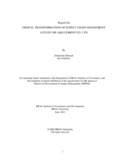| dc.contributor.advisor | Islam, Md. Zikrul | |
| dc.contributor.advisor | Al Masud, Md. Abdullah | |
| dc.contributor.author | Debnath, Debashish | |
| dc.date.accessioned | 2022-01-23T05:59:45Z | |
| dc.date.available | 2022-01-23T05:59:45Z | |
| dc.date.copyright | 2021 | |
| dc.date.issued | 2021-06 | |
| dc.identifier.other | ID 19382021 | |
| dc.identifier.uri | http://hdl.handle.net/10361/15968 | |
| dc.description | This dissertation is submitted in partial fulfillment of the requirements for the degree of Masters in Procurement and Supply Management, 2021. | en_US |
| dc.description | Cataloged from PDF version of dissertation. | |
| dc.description | Includes bibliographical references (pages 57-58). | |
| dc.description.abstract | Digital innovation has affected every aspect of a company's business, including the supply chain and other operating models. Today, with technologies such as RFID, GPS, AI, cloud computing and sensors, organizations can transform their existing hybrid (paper-based and IT support process combination) supply chain management structures into a more versatile, open and fast collaboration digital complete. It can be converted to an automated model. Unlike the hybrid supply chain management model, which results in rigid organizations and business structures, inaccessible information and data, and fragmented relationships with partners, digitally transformed supply chains automate business processes and structure. Allows flexibility and digital management of company assets. So, for the rapping most advantages and others benefit from digital supply chain models, it is a vital issue that companies internalize it as an integral part of the business model and for the organization structure. Localized fragmented businesses and silo-based operations pose serious threats to competitiveness in an increasingly digital world.
Digitization is a new phenomenon that will bring major changes to the cement industry. Digitization is changing the way organizations manage their day-to-day supply chain processes.
This report is based on a qualitative case study research method for gaining an understanding of a new phenomenon. Four topics: digital supplier chain development, supply chain digitalization, and current practice for the digital supply chain in Akij Cement Co. Ltd. | en_US |
| dc.description.statementofresponsibility | Debashish Debnath | |
| dc.format.extent | 60 pages | |
| dc.language.iso | en | en_US |
| dc.publisher | Brac University | en_US |
| dc.rights | Brac University dissertations are protected by copyright. They may be viewed from this source for any purpose, but reproduction or distribution in any format is prohibited without written permission. | |
| dc.subject | Digitalization | en_US |
| dc.subject | Digital supply chain | en_US |
| dc.subject | Lean | en_US |
| dc.subject | Global firms | en_US |
| dc.subject | Digital strategy | en_US |
| dc.subject | Supply chain management | en_US |
| dc.subject | Supplier partnership | en_US |
| dc.subject | Customer relationship | en_US |
| dc.subject | Information communication technology | en_US |
| dc.subject | SCM performance | en_US |
| dc.subject.lcsh | Business logistics | |
| dc.title | Digital transformation of supply chain management -a study on Akij Cement Co. Limited | en_US |
| dc.type | Dissertation | en_US |
| dc.contributor.department | Brac Institute of Governance and Development, Brac University | |
| dc.description.degree | M. Procurement and Supply Management | |

